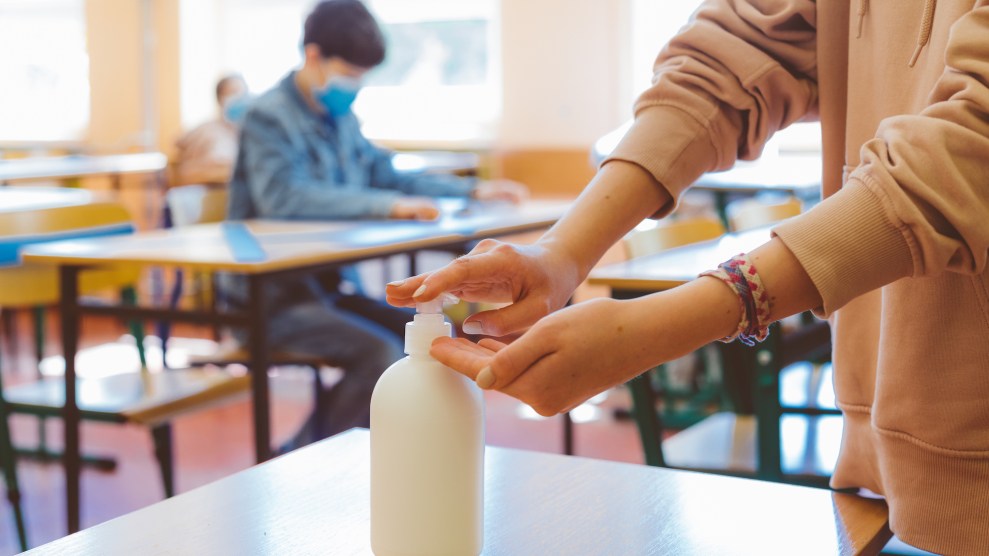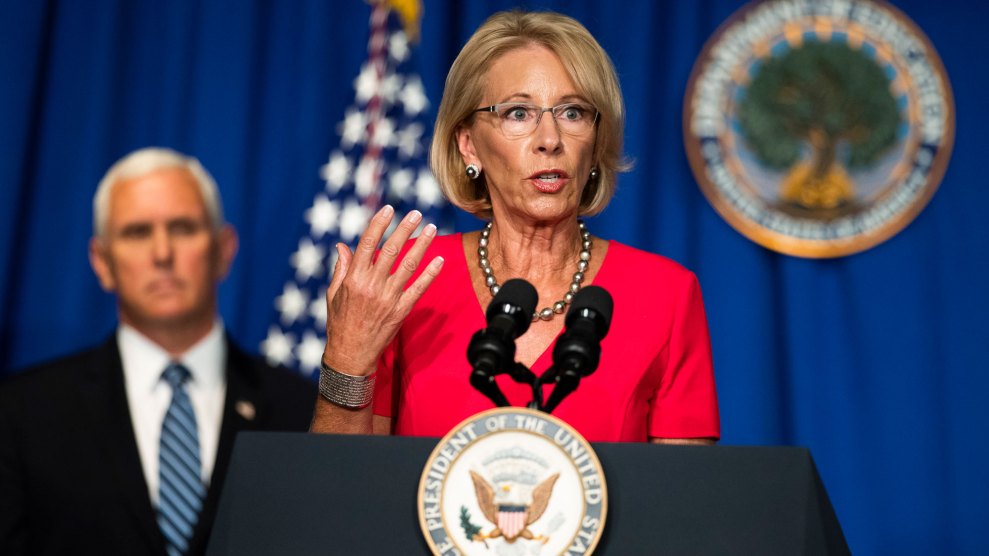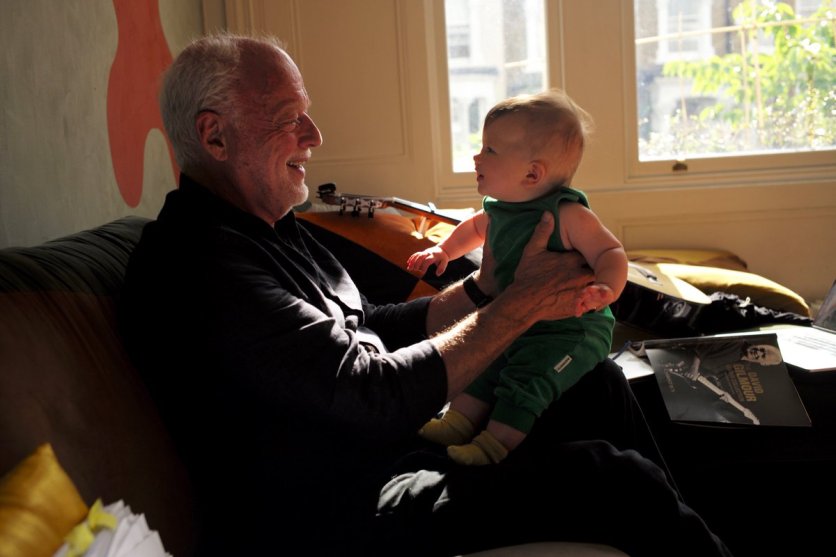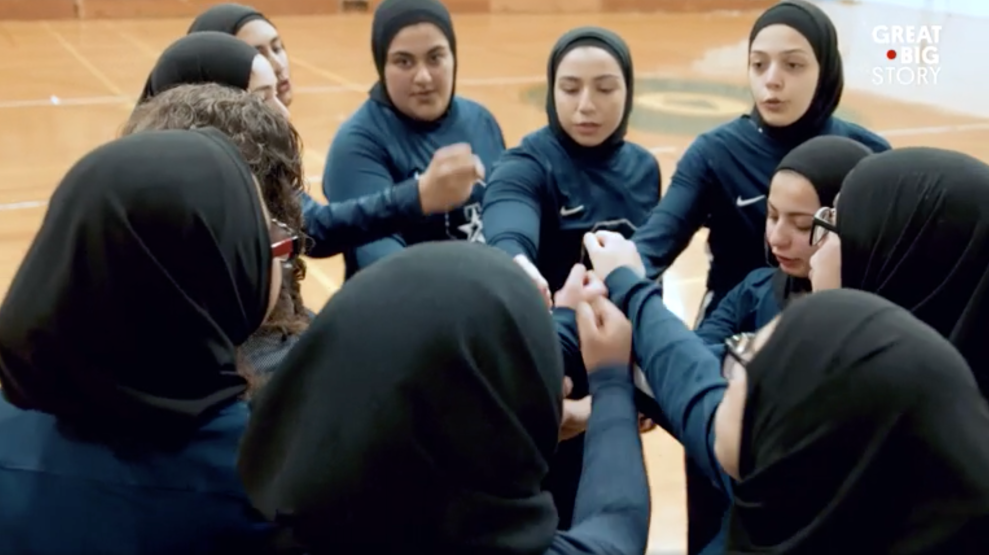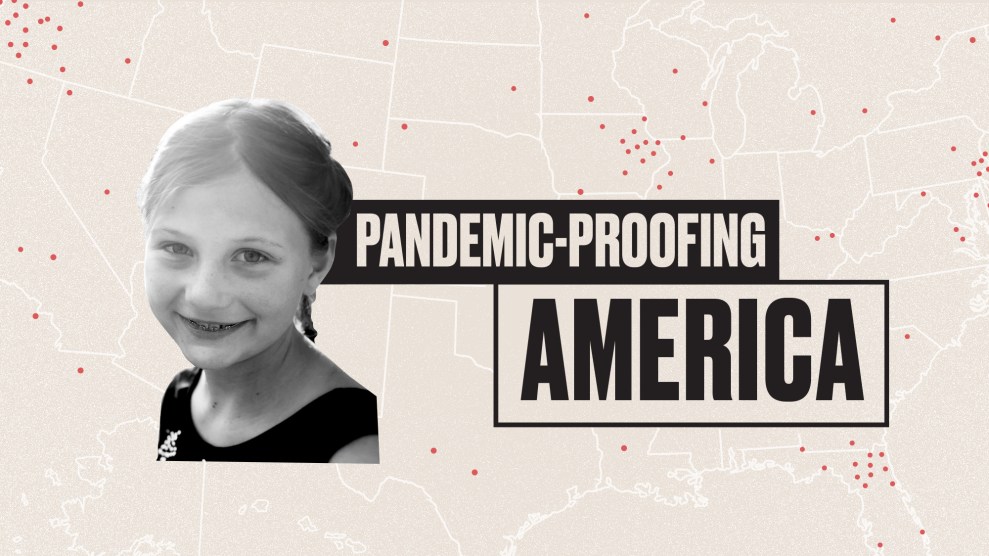
Mother Jones Illustration; Chris Knowles
In many ways, Josie Martin-Knowles has had it good during the pandemic. She lives on a farm in rural Maryland. She has lots of room to run around outside. Plus, there are chickens and goats that she has to feed on the weekends. She has a little sister to play with. Her mom runs an outdoor adventure camp, that reopened this summer under the motto “sunshine and sanitize.” It had some restrictions, with smaller group sizes, regular COVD-19 screenings, no overnights or shared equipment. Still, Josie was able to spend a lot of her hot summer days out on the Potomac River, kayaking, or tubing, or paddling around on a standup paddle board with other kids. She just finished fourth grade at a small private school that is planning to have in-person instruction in the fall. On most mornings, she gets to eat her all-time favorite breakfast: waffles with “loads and loads of Nutella.”
But Josie, age 9, is also coping with the stressors of daily life during a pandemic. The coronavirus experience and the months-long quarantine has been difficult for everyone, but tough for kids in unique ways. There’s the boredom of being stuck inside the house with your family members day after day. There’s the frustration of being filled with energy but only having limited ways to expend it. There’s the way you process time slowly, making the future feel so far away. (After all, as a proportion of a 9 year-old’s life, six months is a lot.) There’s the fact that your sphere of influence, small to begin with, just got even smaller.
“It’s hard,” she told me one morning, as we stood on the bank of the Potomac River. The katydids were buzzing and a gaggle of geese were squawking. The humid air sat heavy around us. Josie was wearing a bright blue rash guard and board shorts, ready for another day out on the water. Since we were outside and socially distant, we had our masks pulled down. I was able to admire her braces, which were her favorite color of pink, though she also likes blue. Her hair was cropped at her shoulders and streaked with blond summer highlights. Josie is talkative and astute. I was curious if she had any advice for how kids can cope with life on lockdown. Here’s a little slice of life during the coronavirus, from the perspective of one girl on the cusp of her 10th birthday.
You can listen to an edited version of our conversation here:
On getting along with siblings: I have one sister. Her name is Katie, and she’s seven years old. We really like making forts with the couch. We play dress up in the basement, which is really fun. Katie has a very big Barbie house, and she really likes playing with the Barbies.
Since we’ve been together for so long, we’ve been getting in a lot of arguments. And it’s kind of hard now because you get into so many arguments. We fight about sharing a lot. If I touch her bed she gets mad, which is kind of hard because our beds are very close together. We share a room.
If you have any siblings, when you start having an argument I think you should just be like, “Okay, I’m gonna take a break because I don’t want to argue right now. And when I’ve calmed down, I’ll come back and talk to you about it. So we can resolve the problem and make it better.” Go and do something by yourself that calms you down.
That’s what I do with my sister. Like when I get mad at my sister, I make pom-poms. I have a lot of pom-poms around the place. When I’m feeling upset, it’ll make the argument bigger because I’m not calm. I need to have some “alone time” so that I can get my feelings together so that I can talk to calmly about it.
I would recommend trying not to make your parents mad. When I did that, my parents got very mad because they were stressed about corona.
On the coronavirus: It can be very serious to some people who are over 70. We have to keep distance or wear masks when we’re nearer to people because we don’t want other people to get it, and we don’t want to spread it. We want to have it controllable so that we can keep going out again and have it not as a risk anymore. And make people feel better about it.
My grandpa’s turning 80 in two weeks and my grandma’s turning 70. They both live in England. I’m kind of sad because normally, we get to go over for their birthday and spend their birthdays there. My grandma and my grandpa and my dad’s birthday are all in the same week. So normally we would go over for their birthdays, and stay at my grandma’s house. But we can’t this summer because we’d have to quarantine for two weeks, and we’d miss their birthdays.
I’m not really scared for them. My grandpa and my grandma are divorced. My grandpa lives by himself, and he has two cats. My aunt has a dog, and grandpa really likes the dog. So he’s been keeping the dog over the whole quarantine. Then he has an excuse to go and walk on the beach because he can go and walk the dog.
On online school: I don’t really like doing the online school. Sometimes it was hard because we had to be on the screens a lot. Our school didn’t do any [online school] on Tuesday because we had “tech-free Tuesdays.” So it was fun. My mom did a little homeschooling with me. She did a lot of PDFs, and our teacher did too. It was kinda hard. And my family didn’t have very many computers because my mom had just broken hers. So my dad had to get his work computer. We used that. But luckily, we have computers in school, and our teacher sent home all of her computers so that we could use them at home.
On a normal day-in-the-life during online school: If I had online school that day, our first meeting would be at eight o’clock. I would have to brush my teeth, eat breakfast, brush my hair, and get dressed. Normally I stay in my pajamas and just put a normal shirt on. Then I’d do some schoolwork, and then have lunch. (I like having lunch really early. At maybe like 10:30.) Then have another meeting after lunch, then do some more schoolwork. Sometimes we would do lunch meetings, and our teacher would read to us because we really like it when our teacher reads to us. Then I’d do more schoolwork. Normally we’d stop doing schoolwork at about 4:00. And then me and Katie would probably like play together or maybe watch the iPad for a little bit. Then have dinner and then get ready to go to bed.
On what online school is like for parents: I think it’s gonna be really hard because also if they’re working, they’re gonna need somebody to look after their kids, even though they’re gonna be having Zoom meetings and stuff. It will be a lot harder because they’ll have to get childcare. You still need someone to look after [the kids]. A girl in my class—her parents were still going to work—so she was staying at home by herself with her older brother and doing Zoom meetings all day. [The kids] at home will probably want things that they wouldn’t normally get on a school day.
On why it’s important for kids to go to school: You need education for a normal basis in life. If you want to get a good job, or a certain job, you need education. I think school is really important. I’m really happy that they’re letting [some] schools open up again.
On good books to read: I like Harry Potter and the Percy Jackson series. I like fantasy stories and mystery and sci-fi.
On whether she has any ideas about what her life will look like when she’s grown up: Nope. Not really. I don’t know. Just expect the best.


